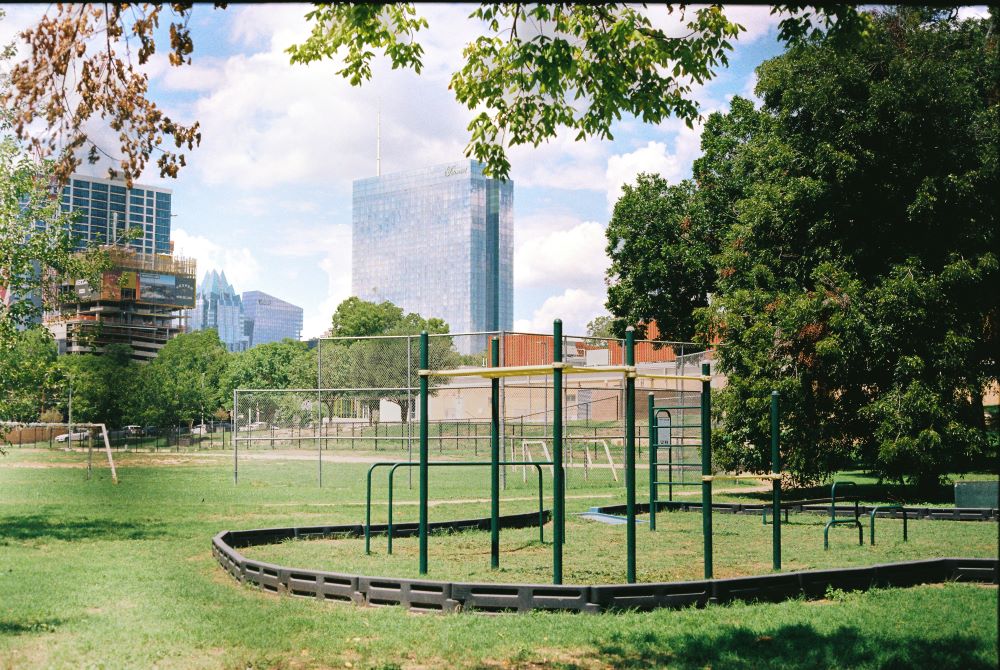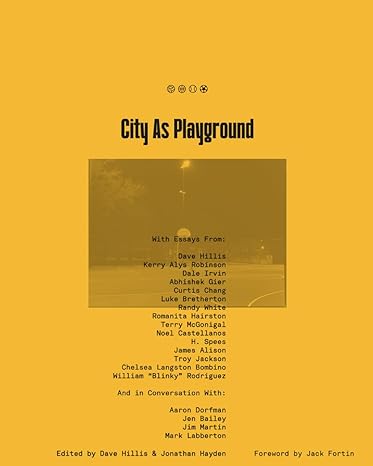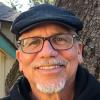
(Unsplash/Mykyta Kravcenko)
Editor's note: Daryl Grigsby serves on the board of directors at Leadership Foundations.
In their recent publication, City as Playground, Leadership Foundations — an organization that leverages the power of relationship to strengthen communities — has curated a compelling collection of insights by pastors, practitioners, theologians, organizers and activists across a spectrum of religious traditions. Without even a mention of the word "ecumenical" in its pages, we find Christian faith in action: Catholics, Lutherans, Baptists, nondenominational traditions, Pentecostals and others reflect together on how God's "good news" can be real for our hurting world.

Leadership Foundations, or LF, is a global, faith-based urban ministry that holds the "city as playground" metaphor at its center. Inspired by the biblical prophet Zechariah, Leadership Foundations works to turn cities from battlegrounds into playgrounds — transforming apathy, division, inequality and violence into communities of care.
The recently released anthology, edited by Dave Hillis and Jonathan Hayden, includes a wide range of faith and service perspectives. The insights mirror the work of LF, which in over 50 cities around the world they join churches, nonprofits, business, schools, government, and others of good faith and goodwill to address pressing challenges in that particular place. In Delhi, India, they address human trafficking and children living on the streets; in Memphis they create jobs for the formerly incarcerated; and in Philippi, West Virginia, they focus on housing for foster children and families impacted by opioid addiction.
The opening pages of the book highlight the metaphor of "city as playground" as a powerful way to both understand and change the reality of life in our cities. The book quotes religious thinker Joseph Campbell, who said, "If you want to change the world, change your metaphor." That insight is followed by the writer Orson Scott Card's observation that, "metaphors have a way of holding the most truth in the least space."
In the first essay, Hillis quotes Stanley Hauerwas, theologian and professor emeritus of Christian ethics at Duke Divinity School, who insisted, "We can only act within the world in which we see. Vision is the necessary prerequisite for ethics." Therefore, our practice, our ethics and our commitments are enlivened and fueled by the vision of a different reality. We are reminded that our work is to confront today's inequality and injustice and work toward a future we currently do not possess.
Our work is to confront today's inequality and injustice and work toward a future we currently do not possess.
Jack Fortin, senior fellow at Augsburg University and former pastor in the Evangelical Lutheran Church in America, points out in the foreword that "While LF figures prominently in this anthology, it is not a book about them. Rather, it is a book that invites us all to consider how we might work in unison. We are really better together."
It is appropriate that the work of many other organizations is cited in the anthology, including Community Renewal International (CRI), Quaker-founded Ellicott City in Maryland, the nonprofit Undivided in Cincinnati and many others. The anthology is a welcome reminder that Christianity in America — and the world — need not be captive to intolerance, judgment, division or fear of the other.
The book is divided into four sections and each follows the same pattern. First, theologians provide philosophical reflections on the theme. Contributing theologians include Romanita Hairston, CEO of M. J. Murdock Charitable Trust, Fr. James Alison and Dale Irvin of the New School of Biblical Theology.
The second category are the "table setters," individuals who address specific issues in the urban environment, including racial reconciliation, resource development and spiritual formation. Here we hear the voices of Jesuit Fr. James Martin and Rev. Jen Bailey of Faith Matters Network.
The third group of essays are from practitioners, among them Rev. Noel Castellanos in Central America, Abishek Gier of Delhi and William "Blinky" Rodriquez of LA's San Fernando Valley. Their insightful observations arise from their work with youth, people who are homeless, victims of trafficking, immigrants and formerly incarcerated individuals.
Other contributors include Kerry Alys Robinson, founding executive director of Leadership Roundtable and president and CEO of Catholic Charities USA; Mark Labberton, former president and professor emeritus at Fuller Seminary; and Curtis Chang, executive director of Redeeming Babel. Robinson reminds us how essential joy and art are to our quest for a healthier city; Labberton, that playground imagery can move us from anxiety to freedom and curiosity; and Chang writes that our active participation in institutions ensures those institutions serve the common good.
Advertisement
The anthology includes a tribute to Harold Spees, a community leader who died tragically in 2023. "H," as he was commonly known, was former director of housing and homelessness services in Fresno and a principal at City Learners. "H" was the embodiment of the Gospel as a source of mercy and service. He spent decades bringing "good news" to others in the form of health care, tutoring, housing and other tangible expressions of God's love.
The tribute to Spees is appropriate. His essay, "Playing among the systems of the city," urges us to look beyond isolation and competition and reach out to others in our quest for peace and justice in our respective cities.
The anthology was funded by The Fetzer Institute. The preface notes that Fetzer "believes in the possibility of a loving world: a world where TFI and partners understand we are all part of one human family and know our lives have purpose. In the world we seek, everyone is committed to courageous compassion and bold love."
Having worked in this space myself for many years, it is hard to overstate the importance of this volume as a resource for practitioners and activists. It achieves Karl Barth's admonition that we hold the newspaper in one hand and the Bible in the other and keep them in continual dialogue as we act, in faith, on behalf of humanity. The anthology is a must read for all — regardless of faith orientation — whose aim is to be a positive force in our 21st century urban world.
The editors cite three outcomes that they hope the anthology achieves. First is to serve as a curated resource for those committed to social renewal; second, as a platform for future conversations between practitioners and theorists; and third, a demonstrable increase in capacity and competency among leaders who read the volume.
All three goals are necessary for those engaged in the difficult work of turning cities from battlegrounds of division and inequality into playgrounds of justice and joy. From my perspective, they more than achieve those goals.







